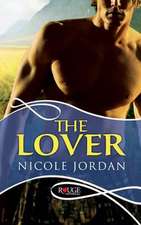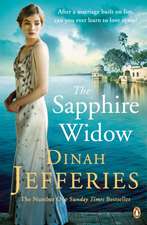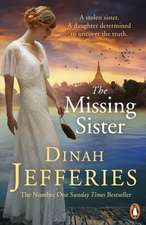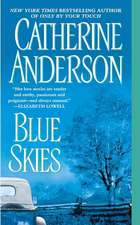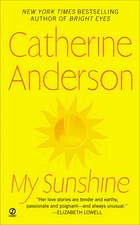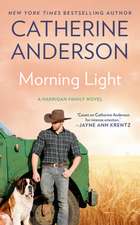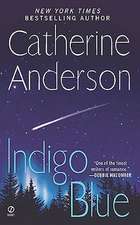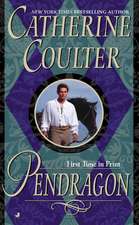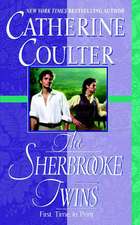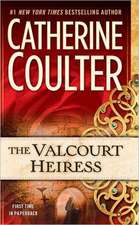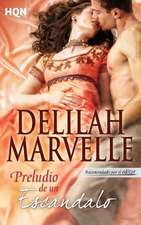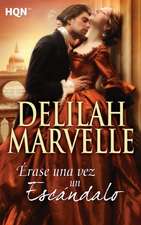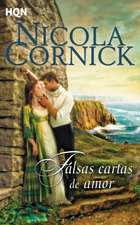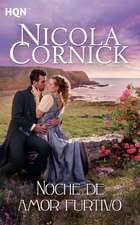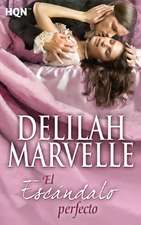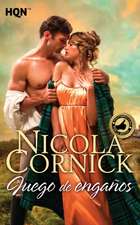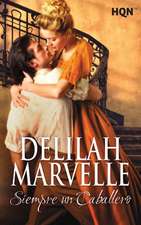Coming Up Roses
Autor Catherine Andersonen Limba Engleză Paperback – 30 apr 2012 – vârsta de la 18 ani
From New York Times bestselling author Catherine Anderson comes the emotionally gripping story of a woman who must overcome her painful past before she can accept a good man’s love...
1890, Oregon. Recently widowed Kate Blakely is struggling to make ends meet on her small farm while trying to heal from the scars of her late husband’s cruelty. When her handsome, brawny neighbor, Zachariah McGovern, almost dies while saving her four-year-old daughter from a near fatal accident, Kate is deeply wary of the man she brings into her home to nurse back to health.
Gradually Kate realizes that underneath Zach’s rough exterior is a gentle, loving soul who is fiercely protective of her and her daughter. But as much as Zach longs for Kate’s love, she knows she can’t open her heart without revealing her darkest secret—a shocking truth that, if discovered, could destroy them both.
1890, Oregon. Recently widowed Kate Blakely is struggling to make ends meet on her small farm while trying to heal from the scars of her late husband’s cruelty. When her handsome, brawny neighbor, Zachariah McGovern, almost dies while saving her four-year-old daughter from a near fatal accident, Kate is deeply wary of the man she brings into her home to nurse back to health.
Gradually Kate realizes that underneath Zach’s rough exterior is a gentle, loving soul who is fiercely protective of her and her daughter. But as much as Zach longs for Kate’s love, she knows she can’t open her heart without revealing her darkest secret—a shocking truth that, if discovered, could destroy them both.
Preț: 51.92 lei
Nou
Puncte Express: 78
Preț estimativ în valută:
9.94€ • 10.80$ • 8.35£
9.94€ • 10.80$ • 8.35£
Carte disponibilă
Livrare economică 01-15 aprilie
Preluare comenzi: 021 569.72.76
Specificații
ISBN-13: 9780451236548
ISBN-10: 0451236548
Pagini: 419
Dimensiuni: 108 x 173 x 31 mm
Greutate: 0.2 kg
Editura: Penguin Books
ISBN-10: 0451236548
Pagini: 419
Dimensiuni: 108 x 173 x 31 mm
Greutate: 0.2 kg
Editura: Penguin Books
Recenzii
“A major voice in the romance genre.”—Publishers Weekly
“Catherine Anderson is an extraordinary talent. She has a voice that is gritty and tender, realistic and romantic, and always unique.”--Elizabeth Lowell
“Catherine Anderson is an extraordinary talent. She has a voice that is gritty and tender, realistic and romantic, and always unique.”--Elizabeth Lowell
Notă biografică
Catherine Andersonis the author of more than thirtyNew York Timesbestselling and award-winning historical and contemporary romances including the Harrigan Family series, the Coulter Family series, the Comanche series, and the Mystic Creek series. She lives in the pristine woodlands of Central Oregon.
Extras
Chapter 1Oregon, 1890
Compliments of an overcast sky, a shaft of anemic afternoon sunshine came through the window of the otherwise cheerless kitchen. Even on fair-weather days, the unpainted plank walls, floor, and ceiling made the room seem bleak.
Leaning sideways to avoid getting smoke in her eyes, Kate Blakely shoved another chunk of laurel into the fire and settled the range lid back into place. Strings of pitch ignited, sizzling and snapping inside the belly of the stove. The merry crackling had always brightened Kate’s mood, and, despite everything, she still loved the sound.
As she walked back across the kitchen, Kate craned her neck to look out the window at the old willow in the yard. The tree’s dense canopy of trailing branches swayed in the light breeze, an indication that it would probably be dark before the storm blew in. From the looks of the clouds hovering over the mountains, they would bring thunder and lightning, too, unless the wind picked up. A real sky ripper.
The thought made the back of Kate’s throat prickle.
She forced the tension from her shoulders. There was nothing to do but put a bright face on it and pretend the darkening sky didn’t worry her. Her little girl, Miranda, became agitated enough during thunderstorms without Kate adding spice to the stew.
Darned weather, anyway. Southwestern Oregon always got a lot of rain, but this year beat all. Here it was mid-June already.
She glanced at the lantern that hung from a ceiling beam above her. During the storm tonight, she would have to light the lamps to keep Miranda calm, and that would deplete their weekly ration of fuel. If she expected to save enough from her egg and milk money to make Miranda some school dresses and buy paint for the kitchen, she couldn’t use a lamp every time the mood struck.
With a sigh, Kate picked up the dog-eared journal and carried it to the trickle of feeble sunlight over the sink. As she circled the slop bucket, used to collect food scraps for the hogs, the swirl of her black cotton twill skirt disturbed a fly. The insect, sluggish from the unseasonably chill weather, buzzed around her head and then swooped down to land on the open pages.
“Confound it.”
She waved the fly away and leaned into the light but still couldn’t tell how many tablespoons of rolled sugar the recipe called for. By all rights, she should know the recipe for her grandma’s crullers by heart, but her husband had never allowed her to make them. Joseph claimed sweets were as addicting and bad for the moral character as alcohol, especially for females who were feebleminded and more easily led astray than men.
Since Joseph’s death, the one luxury Kate spent money on was sugar. Other children had sweets several times a week, and Kate was determined Miranda’s childhood, from here on out, was going to be as normal as she could make it. As far as Kate could tell, neither she nor Miranda had been led astray by their frequent consumption of sugar, or suffered any other ill effects. Unless, of course, one counted the weight each of them had gained. Kate didn’t. Miranda needed meat on her bones, and her own figure was no longer of great importance. If her waist became too thick to be spanned by a man’s hands, so be it. The only time a man would have call to grasp her waist would be to help her out of her wagon when she went to town, and not then if she could avoid it.
“Ma, you’re squintin’ again. If you don’t stop, we’ll need another milk cow to keep you stocked with wrinkle remedy.”
“The devil take wrinkles. What worries me is that I must need spectacles.” Kate held the journal out as far as her arm would reach. “If I don’t stop reading by candlelight, I’ll be blind as a mole before I’m thirty.”
Just the thought of having to give up her nightly reading time made Kate feel anxious. For five endless years, her husband Joseph had never allowed her to open a book, save the Bible, and now that she could read whenever she wished, she couldn’t get enough of it. Two-month-old newspapers. Outdated catalogs. Yellowed issues of Harper’s Bazaar.
If her eyes failed, she’d have to give up those moments she set aside for herself every evening. She didn’t know why, but over the last few months, she had come to need that solitary time even more than she needed sleep, which was saying something.
Selfish, selfish. What if she truly did need spectacles? She had more important uses for her eyes than reading. Sewing, for instance. She couldn’t afford to dress Miranda in ready-made. She shifted her gaze to the crockery bowl on the icebox where she kept her meager savings. Nearly every penny in the bowl was targeted for other expenditures, and she had hoped to save those that weren’t to buy prune trees to start a small orchard next year. Prunes were proving to be a very profitable crop in the Umpqua valley, and since they didn’t require the back muscle that so many other crops did, Kate felt she could raise them.
If she had to buy spectacles, how much would they cost? Unless she missed her guess, they were frightfully expensive. It was yet another worry to add to her list. Feeling overwhelmed, Kate forced her mind back to the moment. Without a husband to provide the necessities, getting by had become enough of a struggle without thinking ahead to disasters that hadn’t even happened yet. Besides, she had to think of Miranda. The child had seen long faces aplenty in her short lifetime.
Giving up on the recipe, she laid down the journal and narrowed an eye at her daughter, who sat atop a stack of books on a chair at the table. It took her a moment to recall what Miranda had been talking about. No small wonder. The child chattered like a squirrel gathering winter nuts. “Where did you hear that milk was a remedy for wrinkles?”
too short to see into the array of green baking canisters before her, Miranda was engaged in a touch-and taste exploration of the ingredients Kate had set out on the table. Having just sampled the sugar, the child licked her finger again, stuck it in the baking soda, tasted, and shuddered. Kate hadn’t the heart to scold. Not long ago, Miranda wouldn’t have dared do such a thing. The change in her was nothing short of a miracle.
Her small face still contorted with distaste, Miranda shuddered again before she answered Kate’s question. “When we was in the general store, I heard Mrs. Raimer talkin’. She says Abigail snipes, the dairyman’s wife, has the purdiest confection in town ’cause her man has so many cows.”
“Complexion, not confection,” Kate corrected. “And keep your fingers out of that saleratus. I don’t mind you sneaking sugar, but the saleratus isn’t to eat.”
“Pa ate it.”
“Only for indigestion.” feeling a little apprehensive at the mention of Joseph because she was never quite sure how Miranda might handle the memories, Kate approached the table with a brisk step and added eight tablespoons of sugar to the ingredients in her bowl. “The recipe be hanged. The sweeter, the better, right?” flicking her daughter a teasing glance, she added, “and I’ll remind you not to contradict your elders, young lady. You’re only four years old, and I guess I know better than you if saleratus is good to eat.”
Miranda swiped at a streak of flour on her cheek. “Do birthdays make people smarter?”
“So they say, which means I’m seventeen birthdays smarter than you, so mind what I say.”
With a dubious glance at the baking soda tin, Miranda said, “I’m not so sure your birthdays made you too smart, ma. If saleratus ain’t to eat and it tastes so powerful bad, how come are ya puttin’ it in our crullers?”
Kate smothered a laugh. “If you don’t like them, the more for me.”
“If our crullers taste like that saleratus, I don’t want none anyhow. It’s nastier than hog slop.”
“You been dipping in the hog slop again? I declare, Miranda Elspeth Blakely, first thing I know you’ll be stealing the chickens’ worms. And it’s isn’t, not ain’t. If you don’t learn to speak properly, what’ll you do next year when school starts?”
“I ain’t—” Miranda broke off and wrinkled her delicate nose. “I isn’t been eatin’ slop, ma. I was just imaginin’.”
Kate chuckled. “If you isn’t been eating slop, then you aren’t sure how it tastes, are you? And in answer to your question, saleratus is added to sweet doughs for rising.” She gave the ingredients in the bowl a stir. “Without just a dash of it our crullers would be flat as dollars and twice as hard.”
Miranda watched the rotations of Kate’s wooden spoon. “Will I like school, ma?” Kate missed a beat. “Of course you will. I loved school when I was a girl.”
“Will you come with me?”
Kate’s mouth went dry. “You’ll be a big girl by then, sweetness, and you won’t want me with you.” Miranda cast a glance downward. “Jeffrey Mullins says I ain’t no bigger than a speck of grasshopper spit.”
Despite the seriousness of the moment and her fears that Miranda might not fare well when she was forced to attend school, Kate had to laugh “Grasshopper spit? What an awful comparison.” She gave her daughter a conspiratorial wink. “You just wait until he sees you in your new dresses. He’ll be so surprised, his freckles will pop right off his nose.”
At the mention of new dresses, Miranda’s eyes danced. Looking adorable even in her patched and faded gray pinafore, she strained to sit tall enough to put her elbows on the table. When she did, she lost her balance and toppled to the floor before Kate could catch her.
“Oh, honey . . .” abandoning her mixing bowl, Kate sank to her knees and lifted Miranda to a sitting position. “Are you all right?”
Suddenly pale, Miranda glanced over her shoulder as if she thought someone had pushed her. The unconscious gesture made Kate’s heart constrict.
“I reckon I’m all right,” the child finally said. “Except for my ubbles.”
Accustomed to Miranda’s near misses in pronunciation, Kate said, “your elbows?” she shoved up the sleeves of Miranda’s blouse to see the barked skin. The injuries were slight, but Kate imagined they stung, nonetheless. “Oh, ouch. Will a kiss on each help?”
Miranda’s cheeks dimpled in a weak smile. “Maybe”
Kate administered the treatment, then smoothed her daughter’s hair and lifted her back onto the stack of books. As she resumed her measuring, she mused aloud, “now, where were we?”
“You was gonna name the colors of my dresses.” Miranda tugged her sleeves down. “Tell me about ’em one more time, ma.”
Kate pretended to ponder. “Let me see. One’s going to be purple.”
“Ugh! Not purple, ma. Robin’s-egg blue!”
“Ah, yes, robin’s-egg blue. And . . . pink.”
“Apple-blossom pink,” Miranda corrected.
“And red,” Kate finished.
“Rose-petal red. Now, say ’em all at once.”
Kate made a nonsensical jabbering noise and blew air past her lips, which sent Miranda into a fit of giggles. When the child recovered from her mirth, she said, “not all at once like that. One word at a time.”
“Robin’s-egg blue, rose-petal red, and apple-blossom pink,” Kate recited, mentally crossing her fingers that no unexpected expenses would crop up. If any little girl deserved three beautiful new dresses, Miranda did.
“Will I git lots of icicles on my petticoats?”
Kate stopped measuring again. “Icicles? What in tarnation?”
“You know . . . like them that the widow Darby hangs in her parlor window at Christmas. You said they was cutout icicles, and the other day I saw a lady in town with lots of ’em on her petticoats.”
“You mean eyelet lace,” Kate corrected with a chuckle. “I don’t know, Miranda. My egg money may not stretch far enough to buy eyelet. Maybe I can sneak a look at Mrs. Raimer’s Montgomery Ward catalog and find a better buy than we can get in town. We’ll see, hm?”
As Kate folded in the last ingredient, she recalled the lace on her wedding gown, which was stored upstairs in her camelback trunk. If the gown hadn’t yellowed too badly, perhaps Miranda could have icicles on her petticoats after all. Envisioning how sweet Miranda would look, all decked out in her first day of school finery, Kate got tears in her eyes.
“Why you cryin’?”
Kate wiped beneath her eye. “Lands, Miranda, I don’t know. I was just thinking how pretty you’re going to look and how proud I’ll be of you that first day of school, and there you are. My ma called them happy tears, and I reckon that’s as close to an explanation as I can get.”
“I never heard of a happy crier before.”
Kate shrugged.
“You’re s’posed to cry over sad things, or when you get hurt, but I ain’t never seen you do it. Why come is that, ma?”
“Because I don’t let myself.”
“So why do you let yourself cry when good things happen?”
Kate wasn’t sure she could answer that. “Happy tears sort of sneak up on a body.”
“So you don’t know they’re comin’?”
“That’s right. Who expects to cry over wonderful things? No rhyme nor reason to it, the first thing I know, I’m all weepy eyed and everybody thinks I’m crazy.”
“I don’t.”
“That’s because you love me. I’m a strange one in everyone else’s books. It’s female hysterics, I reckon. At least that’s what your—” Kate hesitated, not at all sure she should mention Joseph again. “That’s what lots of folks claim, anyway.”
“What’s female hysterics?”
Kate pinched some dough to test the texture. “It’s a perplexity to me, but I reckon I’ve got an incurable case. I thought about getting myself some Goff’s Giant Globules. The advertisement I saw in the Morning Oregonian says they’re the strongest female nerve tonic known.”
“You gonna order some?”
Kate gave the dough a final stir. “Not likely. They cost a whole dollar for two weeks’ treatment.” she leaned over to kiss Miranda’s forehead. “With you around, I’d lose the farm trying to cure myself of happy tears.”
Miranda stretched to touch the bottle of knight’s apple Cider. “You don’t need them old globules, anyhow. Your happy tears make your eyes shine purdy, and they go away fast.”
“Thank goodness for that.”
Drawing the cider bottle closer, Miranda asked, “What’s this for? I ain’t never tasted nothin’ so plumb awful sour.”
Realizing that Miranda must have sampled the cider earlier, Kate snatched the bottle away. “I swan, Miranda, you’ll be needing a dose of lemon milk for your upset stomach before these crullers are done. Leave off, now, and keep out of things. You can’t eat sweets if you’re sick.”
“If crullers is sweet, how come sour stuff goes into ’em?”
The child could ask more questions than voters at an election speech. “Truth to tell, the recipe calls for a tablespoon of dry wine, which we don’t have, so I’m substituting. And, once again in answer to your question, it beats the sass out of me why a dash of something so sour is called for.”
“What’s wine?”
“Sinners’ swill, and don’t be asking what that is because you don’t need to know.”
Curiosity gleamed in Miranda’s brown eyes. “Wine is what our new neighbor is tryin’ to grow, ain’t it? Mrs. Raimer said.”
“He’s going to grow grapes. Wine is the drink he hopes to make from them.”
“And wine is sinners’ swill?”
“Yes, little ma’am, that’s exactly what it is, and that’ll be the end of the subject.”
Kate wiped her palms on her white apron and stepped to the stove to check her kettle of lard to see if it was hot enough for frying.
“Is that how come we didn’t take him a loaf of welcome bread? Because he come here to make sinners’ swill?”
“Came, not come. And, yes, that’s why. I want no truck with a drinking neighbor, which a man who plans to build a winery must surely be.”
Satisfied that the melted lard was plenty hot, Kate returned to the table to fetch her dough. As she dropped dollops of it into the sizzling grease, a loud thunk resounded through the house. Another quickly followed. It sounded as if someone was out in their yard chucking stones at the house. Kate glanced up, and Miranda went perfectly still.
Her eyes large with alarm, Miranda whispered, “you reckon he heard you and comed over here to throw rocks at us?”
Kate smiled reassuringly as she set the bowl of dough on the warming shelf. “If he has, I reckon we’ll just throw them back. Don’t be a goose, Miranda. There’s nothing to be afraid of.”
Miranda slid off her elevated perch. “You ain’t seen how big and mean lookin’ he is.”
“And you have? Don’t tell me you’ve wandered over there?”
Before Miranda could answer, something struck the house again and distracted Kate. With the child following in her wake, she went to investigate, feeling a tad uneasy in spite of herself. It was bad enough that their new neighbor, Zachariah McGovern, was probably a drinking man, let alone big and mean. She had troubles enough running this farm without adding an inebriated, cantankerous, and oversized neighbor to the list.
Kate was totally unprepared for the sight that greeted her when she opened the front door. A large yellow and-white dog was digging gigantic holes in her rose garden along the fence, the damp, well-turned earth flying in wide arcs behind him. Miranda caught her breath and gave a dismayed squeak.
“Consternation!” Kate ran across the stoop and down the steps. “Shoo! Bad dog!” the dog, seemingly oblivious to her cries, never paused in his excavations. Kate snapped her apron at him. “Shoo, I said! Confound it, look what you’ve done. Go home. Go on, git!”
Throwing up a thin little arm to shield her face from the flying dirt, Miranda followed Kate into the yard. “Make him stop, ma. Hurry and make him stop before he digs it all up!”
Kate was trying, but the dog didn’t seem particularly intimidated. Her pulse skittery with building anger, she raced back into the house for her broom. She’d show that ill-mannered mongrel what for, and next time he’d think twice about digging holes at the Blakely place.
Compliments of an overcast sky, a shaft of anemic afternoon sunshine came through the window of the otherwise cheerless kitchen. Even on fair-weather days, the unpainted plank walls, floor, and ceiling made the room seem bleak.
Leaning sideways to avoid getting smoke in her eyes, Kate Blakely shoved another chunk of laurel into the fire and settled the range lid back into place. Strings of pitch ignited, sizzling and snapping inside the belly of the stove. The merry crackling had always brightened Kate’s mood, and, despite everything, she still loved the sound.
As she walked back across the kitchen, Kate craned her neck to look out the window at the old willow in the yard. The tree’s dense canopy of trailing branches swayed in the light breeze, an indication that it would probably be dark before the storm blew in. From the looks of the clouds hovering over the mountains, they would bring thunder and lightning, too, unless the wind picked up. A real sky ripper.
The thought made the back of Kate’s throat prickle.
She forced the tension from her shoulders. There was nothing to do but put a bright face on it and pretend the darkening sky didn’t worry her. Her little girl, Miranda, became agitated enough during thunderstorms without Kate adding spice to the stew.
Darned weather, anyway. Southwestern Oregon always got a lot of rain, but this year beat all. Here it was mid-June already.
She glanced at the lantern that hung from a ceiling beam above her. During the storm tonight, she would have to light the lamps to keep Miranda calm, and that would deplete their weekly ration of fuel. If she expected to save enough from her egg and milk money to make Miranda some school dresses and buy paint for the kitchen, she couldn’t use a lamp every time the mood struck.
With a sigh, Kate picked up the dog-eared journal and carried it to the trickle of feeble sunlight over the sink. As she circled the slop bucket, used to collect food scraps for the hogs, the swirl of her black cotton twill skirt disturbed a fly. The insect, sluggish from the unseasonably chill weather, buzzed around her head and then swooped down to land on the open pages.
“Confound it.”
She waved the fly away and leaned into the light but still couldn’t tell how many tablespoons of rolled sugar the recipe called for. By all rights, she should know the recipe for her grandma’s crullers by heart, but her husband had never allowed her to make them. Joseph claimed sweets were as addicting and bad for the moral character as alcohol, especially for females who were feebleminded and more easily led astray than men.
Since Joseph’s death, the one luxury Kate spent money on was sugar. Other children had sweets several times a week, and Kate was determined Miranda’s childhood, from here on out, was going to be as normal as she could make it. As far as Kate could tell, neither she nor Miranda had been led astray by their frequent consumption of sugar, or suffered any other ill effects. Unless, of course, one counted the weight each of them had gained. Kate didn’t. Miranda needed meat on her bones, and her own figure was no longer of great importance. If her waist became too thick to be spanned by a man’s hands, so be it. The only time a man would have call to grasp her waist would be to help her out of her wagon when she went to town, and not then if she could avoid it.
“Ma, you’re squintin’ again. If you don’t stop, we’ll need another milk cow to keep you stocked with wrinkle remedy.”
“The devil take wrinkles. What worries me is that I must need spectacles.” Kate held the journal out as far as her arm would reach. “If I don’t stop reading by candlelight, I’ll be blind as a mole before I’m thirty.”
Just the thought of having to give up her nightly reading time made Kate feel anxious. For five endless years, her husband Joseph had never allowed her to open a book, save the Bible, and now that she could read whenever she wished, she couldn’t get enough of it. Two-month-old newspapers. Outdated catalogs. Yellowed issues of Harper’s Bazaar.
If her eyes failed, she’d have to give up those moments she set aside for herself every evening. She didn’t know why, but over the last few months, she had come to need that solitary time even more than she needed sleep, which was saying something.
Selfish, selfish. What if she truly did need spectacles? She had more important uses for her eyes than reading. Sewing, for instance. She couldn’t afford to dress Miranda in ready-made. She shifted her gaze to the crockery bowl on the icebox where she kept her meager savings. Nearly every penny in the bowl was targeted for other expenditures, and she had hoped to save those that weren’t to buy prune trees to start a small orchard next year. Prunes were proving to be a very profitable crop in the Umpqua valley, and since they didn’t require the back muscle that so many other crops did, Kate felt she could raise them.
If she had to buy spectacles, how much would they cost? Unless she missed her guess, they were frightfully expensive. It was yet another worry to add to her list. Feeling overwhelmed, Kate forced her mind back to the moment. Without a husband to provide the necessities, getting by had become enough of a struggle without thinking ahead to disasters that hadn’t even happened yet. Besides, she had to think of Miranda. The child had seen long faces aplenty in her short lifetime.
Giving up on the recipe, she laid down the journal and narrowed an eye at her daughter, who sat atop a stack of books on a chair at the table. It took her a moment to recall what Miranda had been talking about. No small wonder. The child chattered like a squirrel gathering winter nuts. “Where did you hear that milk was a remedy for wrinkles?”
too short to see into the array of green baking canisters before her, Miranda was engaged in a touch-and taste exploration of the ingredients Kate had set out on the table. Having just sampled the sugar, the child licked her finger again, stuck it in the baking soda, tasted, and shuddered. Kate hadn’t the heart to scold. Not long ago, Miranda wouldn’t have dared do such a thing. The change in her was nothing short of a miracle.
Her small face still contorted with distaste, Miranda shuddered again before she answered Kate’s question. “When we was in the general store, I heard Mrs. Raimer talkin’. She says Abigail snipes, the dairyman’s wife, has the purdiest confection in town ’cause her man has so many cows.”
“Complexion, not confection,” Kate corrected. “And keep your fingers out of that saleratus. I don’t mind you sneaking sugar, but the saleratus isn’t to eat.”
“Pa ate it.”
“Only for indigestion.” feeling a little apprehensive at the mention of Joseph because she was never quite sure how Miranda might handle the memories, Kate approached the table with a brisk step and added eight tablespoons of sugar to the ingredients in her bowl. “The recipe be hanged. The sweeter, the better, right?” flicking her daughter a teasing glance, she added, “and I’ll remind you not to contradict your elders, young lady. You’re only four years old, and I guess I know better than you if saleratus is good to eat.”
Miranda swiped at a streak of flour on her cheek. “Do birthdays make people smarter?”
“So they say, which means I’m seventeen birthdays smarter than you, so mind what I say.”
With a dubious glance at the baking soda tin, Miranda said, “I’m not so sure your birthdays made you too smart, ma. If saleratus ain’t to eat and it tastes so powerful bad, how come are ya puttin’ it in our crullers?”
Kate smothered a laugh. “If you don’t like them, the more for me.”
“If our crullers taste like that saleratus, I don’t want none anyhow. It’s nastier than hog slop.”
“You been dipping in the hog slop again? I declare, Miranda Elspeth Blakely, first thing I know you’ll be stealing the chickens’ worms. And it’s isn’t, not ain’t. If you don’t learn to speak properly, what’ll you do next year when school starts?”
“I ain’t—” Miranda broke off and wrinkled her delicate nose. “I isn’t been eatin’ slop, ma. I was just imaginin’.”
Kate chuckled. “If you isn’t been eating slop, then you aren’t sure how it tastes, are you? And in answer to your question, saleratus is added to sweet doughs for rising.” She gave the ingredients in the bowl a stir. “Without just a dash of it our crullers would be flat as dollars and twice as hard.”
Miranda watched the rotations of Kate’s wooden spoon. “Will I like school, ma?” Kate missed a beat. “Of course you will. I loved school when I was a girl.”
“Will you come with me?”
Kate’s mouth went dry. “You’ll be a big girl by then, sweetness, and you won’t want me with you.” Miranda cast a glance downward. “Jeffrey Mullins says I ain’t no bigger than a speck of grasshopper spit.”
Despite the seriousness of the moment and her fears that Miranda might not fare well when she was forced to attend school, Kate had to laugh “Grasshopper spit? What an awful comparison.” She gave her daughter a conspiratorial wink. “You just wait until he sees you in your new dresses. He’ll be so surprised, his freckles will pop right off his nose.”
At the mention of new dresses, Miranda’s eyes danced. Looking adorable even in her patched and faded gray pinafore, she strained to sit tall enough to put her elbows on the table. When she did, she lost her balance and toppled to the floor before Kate could catch her.
“Oh, honey . . .” abandoning her mixing bowl, Kate sank to her knees and lifted Miranda to a sitting position. “Are you all right?”
Suddenly pale, Miranda glanced over her shoulder as if she thought someone had pushed her. The unconscious gesture made Kate’s heart constrict.
“I reckon I’m all right,” the child finally said. “Except for my ubbles.”
Accustomed to Miranda’s near misses in pronunciation, Kate said, “your elbows?” she shoved up the sleeves of Miranda’s blouse to see the barked skin. The injuries were slight, but Kate imagined they stung, nonetheless. “Oh, ouch. Will a kiss on each help?”
Miranda’s cheeks dimpled in a weak smile. “Maybe”
Kate administered the treatment, then smoothed her daughter’s hair and lifted her back onto the stack of books. As she resumed her measuring, she mused aloud, “now, where were we?”
“You was gonna name the colors of my dresses.” Miranda tugged her sleeves down. “Tell me about ’em one more time, ma.”
Kate pretended to ponder. “Let me see. One’s going to be purple.”
“Ugh! Not purple, ma. Robin’s-egg blue!”
“Ah, yes, robin’s-egg blue. And . . . pink.”
“Apple-blossom pink,” Miranda corrected.
“And red,” Kate finished.
“Rose-petal red. Now, say ’em all at once.”
Kate made a nonsensical jabbering noise and blew air past her lips, which sent Miranda into a fit of giggles. When the child recovered from her mirth, she said, “not all at once like that. One word at a time.”
“Robin’s-egg blue, rose-petal red, and apple-blossom pink,” Kate recited, mentally crossing her fingers that no unexpected expenses would crop up. If any little girl deserved three beautiful new dresses, Miranda did.
“Will I git lots of icicles on my petticoats?”
Kate stopped measuring again. “Icicles? What in tarnation?”
“You know . . . like them that the widow Darby hangs in her parlor window at Christmas. You said they was cutout icicles, and the other day I saw a lady in town with lots of ’em on her petticoats.”
“You mean eyelet lace,” Kate corrected with a chuckle. “I don’t know, Miranda. My egg money may not stretch far enough to buy eyelet. Maybe I can sneak a look at Mrs. Raimer’s Montgomery Ward catalog and find a better buy than we can get in town. We’ll see, hm?”
As Kate folded in the last ingredient, she recalled the lace on her wedding gown, which was stored upstairs in her camelback trunk. If the gown hadn’t yellowed too badly, perhaps Miranda could have icicles on her petticoats after all. Envisioning how sweet Miranda would look, all decked out in her first day of school finery, Kate got tears in her eyes.
“Why you cryin’?”
Kate wiped beneath her eye. “Lands, Miranda, I don’t know. I was just thinking how pretty you’re going to look and how proud I’ll be of you that first day of school, and there you are. My ma called them happy tears, and I reckon that’s as close to an explanation as I can get.”
“I never heard of a happy crier before.”
Kate shrugged.
“You’re s’posed to cry over sad things, or when you get hurt, but I ain’t never seen you do it. Why come is that, ma?”
“Because I don’t let myself.”
“So why do you let yourself cry when good things happen?”
Kate wasn’t sure she could answer that. “Happy tears sort of sneak up on a body.”
“So you don’t know they’re comin’?”
“That’s right. Who expects to cry over wonderful things? No rhyme nor reason to it, the first thing I know, I’m all weepy eyed and everybody thinks I’m crazy.”
“I don’t.”
“That’s because you love me. I’m a strange one in everyone else’s books. It’s female hysterics, I reckon. At least that’s what your—” Kate hesitated, not at all sure she should mention Joseph again. “That’s what lots of folks claim, anyway.”
“What’s female hysterics?”
Kate pinched some dough to test the texture. “It’s a perplexity to me, but I reckon I’ve got an incurable case. I thought about getting myself some Goff’s Giant Globules. The advertisement I saw in the Morning Oregonian says they’re the strongest female nerve tonic known.”
“You gonna order some?”
Kate gave the dough a final stir. “Not likely. They cost a whole dollar for two weeks’ treatment.” she leaned over to kiss Miranda’s forehead. “With you around, I’d lose the farm trying to cure myself of happy tears.”
Miranda stretched to touch the bottle of knight’s apple Cider. “You don’t need them old globules, anyhow. Your happy tears make your eyes shine purdy, and they go away fast.”
“Thank goodness for that.”
Drawing the cider bottle closer, Miranda asked, “What’s this for? I ain’t never tasted nothin’ so plumb awful sour.”
Realizing that Miranda must have sampled the cider earlier, Kate snatched the bottle away. “I swan, Miranda, you’ll be needing a dose of lemon milk for your upset stomach before these crullers are done. Leave off, now, and keep out of things. You can’t eat sweets if you’re sick.”
“If crullers is sweet, how come sour stuff goes into ’em?”
The child could ask more questions than voters at an election speech. “Truth to tell, the recipe calls for a tablespoon of dry wine, which we don’t have, so I’m substituting. And, once again in answer to your question, it beats the sass out of me why a dash of something so sour is called for.”
“What’s wine?”
“Sinners’ swill, and don’t be asking what that is because you don’t need to know.”
Curiosity gleamed in Miranda’s brown eyes. “Wine is what our new neighbor is tryin’ to grow, ain’t it? Mrs. Raimer said.”
“He’s going to grow grapes. Wine is the drink he hopes to make from them.”
“And wine is sinners’ swill?”
“Yes, little ma’am, that’s exactly what it is, and that’ll be the end of the subject.”
Kate wiped her palms on her white apron and stepped to the stove to check her kettle of lard to see if it was hot enough for frying.
“Is that how come we didn’t take him a loaf of welcome bread? Because he come here to make sinners’ swill?”
“Came, not come. And, yes, that’s why. I want no truck with a drinking neighbor, which a man who plans to build a winery must surely be.”
Satisfied that the melted lard was plenty hot, Kate returned to the table to fetch her dough. As she dropped dollops of it into the sizzling grease, a loud thunk resounded through the house. Another quickly followed. It sounded as if someone was out in their yard chucking stones at the house. Kate glanced up, and Miranda went perfectly still.
Her eyes large with alarm, Miranda whispered, “you reckon he heard you and comed over here to throw rocks at us?”
Kate smiled reassuringly as she set the bowl of dough on the warming shelf. “If he has, I reckon we’ll just throw them back. Don’t be a goose, Miranda. There’s nothing to be afraid of.”
Miranda slid off her elevated perch. “You ain’t seen how big and mean lookin’ he is.”
“And you have? Don’t tell me you’ve wandered over there?”
Before Miranda could answer, something struck the house again and distracted Kate. With the child following in her wake, she went to investigate, feeling a tad uneasy in spite of herself. It was bad enough that their new neighbor, Zachariah McGovern, was probably a drinking man, let alone big and mean. She had troubles enough running this farm without adding an inebriated, cantankerous, and oversized neighbor to the list.
Kate was totally unprepared for the sight that greeted her when she opened the front door. A large yellow and-white dog was digging gigantic holes in her rose garden along the fence, the damp, well-turned earth flying in wide arcs behind him. Miranda caught her breath and gave a dismayed squeak.
“Consternation!” Kate ran across the stoop and down the steps. “Shoo! Bad dog!” the dog, seemingly oblivious to her cries, never paused in his excavations. Kate snapped her apron at him. “Shoo, I said! Confound it, look what you’ve done. Go home. Go on, git!”
Throwing up a thin little arm to shield her face from the flying dirt, Miranda followed Kate into the yard. “Make him stop, ma. Hurry and make him stop before he digs it all up!”
Kate was trying, but the dog didn’t seem particularly intimidated. Her pulse skittery with building anger, she raced back into the house for her broom. She’d show that ill-mannered mongrel what for, and next time he’d think twice about digging holes at the Blakely place.
Descriere
The bestselling author of the Comanche trilogy sets this bittersweet, highly charged romance in the Oregon territory. Widow Kate Blakely knew nothing of love, and when she met her new neighbor, Zachariah McGovern, all she saw was danger. But Zach saw much more. Reissue.

